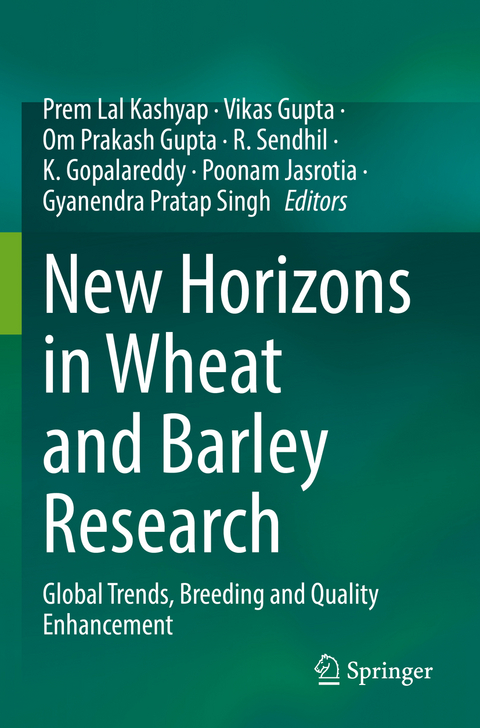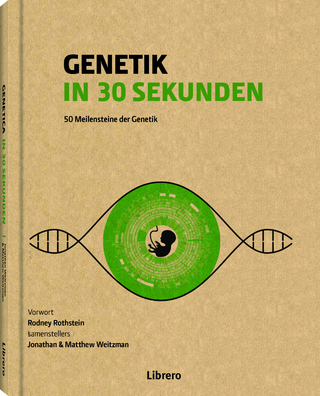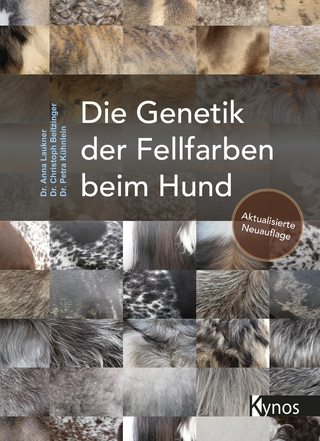
New Horizons in Wheat and Barley Research
Springer Verlag, Singapore
978-981-16-4451-1 (ISBN)
This book is of interest to teachers, researchers, molecular breeders, cereal biochemists and biotechnologist, policymakers and professionals working in the area of wheat and barley research, food and cereal industry. Also, the book serves as an additional reading material for the undergraduate and graduate students of agriculture and food sciences. National and international agricultural scientists, policy makers will also find this book to be a useful read.
Volume 2 of New Horizons in Wheat and Barley Research covers topics in crop protection and resource management.
Dr. Prem Lal Kashyap is a scientist (Plant Pathology) at ICAR -Indian Institute of Wheat and Barley Research, Karnal. He obtained his M. Sc. and Ph.D. degrees from Punjab Agricultural University, Ludhiana, India. He has been actively engaged in wheat pathology research. His major research interests include molecular biology of wheat pathogens, population biology, host-pathogen interactions and biological disease management. He joined wheat pathology programme in 2016 and contributed to the development of multiple disease resistance cultivars and genetics stocks, identification of new races of yellow rust of wheat in India, molecular diagnostics technologies for precise and rapid identification of fungal pathogens and sustainable diseases management practices besides capacity building of several stakeholders across India for linking science with society. His interactions and visits to different countries including, the USA, Mexico, Kenya, Bolivia and Bangladesh have helped insignificant exchange of ideas and improved research outputs. He has published more than 70 research articles in high impact journals and edited 6 books. He served Indian Phytopathological Society (IPS) as a Zonal councilor and associated with several international peer reviewed journals in the capacity of associate editor and reviewer. Dr. Kashyap is a recipient of several awards including Dr. Basant Ram Young Scientist Award, Prof. Abrar Mustafa Memorial Award, M. K. Patel Memorial Young Scientist Award and Prof. Mahatim Singh Memorial Award. He received Young Scientist Award and Associateship of National Academy of Agricultural Sciences (India) for his outstanding contribution in the field of crop protection. Dr. Vikas Gupta is a wheat breeder at the ICAR-Indian Institute of Wheat and Barley Research, Karnal, Haryana, India. He received his agricultural education from Sher-e-Kashmir University of Agricultural Sciences and Technology of Jammu (J&K), CCS University, Meerut (UP) and Punjab Agricultural University, Ludhiana (Punjab). His areas of interest include resistance breeding, Bio-fortification and input use efficiency. He has been credited with the development of first Indian bio-fortified bread wheat variety (WB 2) and registered 15 wheat genetic stocks for different agronomic traits. Dr. Gupta worked as visiting scientist at Washington State University Pullman (USA) in 2015 and also in the International Maize and Wheat Improvement Center, Mexico in 2018. Dr. Gupta has published several scientific articles in peer-reviewed journals and currently serving as associate editor in ‘Journal of Cereal Research’. Dr. Om Prakash Gupta is a scientist (Plant Biochemistry) at ICAR-Indian Institute of Wheat and Barley Research, Karnal, Haryana, India. He obtained his M.Sc. and Ph.D. degrees from ICAR-Indian Agricultural Research Institute, New Delhi. He has been actively engaged in research and teaching in th^80 research publications and serving as editorial board members of many peer-reviewed journals. Dr. Gupta is recipient of several academic awards including Jawaharlal Nehru Award for outstanding doctoral thesis by ICAR, and University Silver Medal, Aspee Gold Medal and Dr. Kirtikar Memorial Gold Medal, Chowdhary Charan Singh Memorial Award during his Bachelor degree programme. He is fellow of the Society for Advancement of Wheat and Barley Research. Dr. Sendhil R. presently serves as a scientist at the ICAR-Indian Institute of Wheat and Barley Research under the aegis of Indian Council of Agricultural Research. He holds about 14 years of experience in R& D and published around 95 research papers in peer reviewed journals. He is committed to his professionalism and honoured with several recognitions including the Lal Bhadur Shastri Outstanding Young Scientist (ICAR), Fellow (SAWBAR), Prof. Mahatim Singh Memorial Award (SAWBAR), Uma Lele Mentorship Award (AAEA), NFP grant (NUFFIC), IARI Fellowship and ICAR-JRF. He also teaches and mentors M.Sc and Ph. D. Scholars at the ICAR-National Dairy Research Institute, Karnal. His research interest includes food and nutrition security, value chain development, climate change, market outlook, impact assessment, and, technology policy focusing on multi-disciplinary and multi-institutional research & devlopment; learning fostering for innovations and policy formulation leading to agricultural transformation, especially under the wheat and barley production system. Dr. Gopalareddy K. is a scientist (Genetics and Plant Breeding) at ICAR-Indian Institute of Wheat and Barley Research, Karnal, Haryana, India. He obtained his B.Sc. and M.Sc. degrees from University of Agricultural Sciences, Bangalore and Ph.D. from ICAR-Indian Agricultural Research Institute, New Delhi. Dr. Reddy was involved in the development of seven wheat varieties and 15 genetic stocks. His research is largely focused in the development of high yielding wheat varieties with improved quality attributes through conventional and molecular approaches. He published more than 20 research and review articles of national and international repute. He is a recipient of Young Scientist Award by All India Agricultural Students Association and Best Worker Award by ICAR- Indian Institute of Wheat and Barley Research. Dr. Poonam Jasrotia is a principal scientist at Division of Crop Protection, ICAR-Indian Institute of Wheat and Barley Research, Karnal, Haryana, India. She has more than 12 year’s research experience in the field of Agricultural Entomology. She obtained her M. Sc. and Ph.D. degrees from Himachal Pradesh Agricultural University, Palampur, India. Her current research work focuses on host plant resistance to cereal aphids and eco-friendly insect-pest management of stored grain pests of wheat and barley. Dr. Jasrotia has diverse experience of working in International organizations such as in Agricultural Research Organization (ARO), Volcani Center of Israel, North Carolina State University, Raleigh, USA and Great Lakes Bioenergy Research Center (GLBRC) at Michigan State University, MI, USA. She has published more than 40 research publications in high impact journals. She is a fellow of Entomological Society of India and Associate Editor in Springer Journal “Ecological Processes”. Dr. Gyanendra Pratap Singh is a director at ICAR-Indian Institute of Wheat and Barley Research, Karnal, Haryana, India. He obtained his B.Sc. and M.Sc. from Banaras Hindu University, Varanasi and Ph.D. from Chandra Shekhar Azad University of Agriculture & Technology, Kanpur. Dr. Singh is instrumental in the development of 51 wheat, three barley and one potato variety. Dr. Singh largely focused in intrinsic research on heat and drought tolerance for wheat improvement in India and developed many climate resilient wheat varieties. He published more than 200 research articles. He is a recipient of many prestigious awards including Dr. Rafi Ahmed Kidwai, Prof. AB Joshi Memorial, Dr. K. Ramiah Memorial, Dr. BP Pal, Dr. VS Mathur Memorial, Nanaji Deshmuk Outstanding Team, BGRI Gene Stewardship, Amrik Singh Cheema, AIASA National Award for Outstanding Leadership, Agriculture Leadership, and Best Scientist Award. Dr. Singh is elected fellow of National Academy of Agricultural Sciences, Indian Society of Genetics and Plant Breeding and Society for Advancement of Wheat and Barley Research.
Part 1 Global Trends and policy perspectives.- 1 Wheat and Barley Production Trends and Research Priorities: A Global Perspective.- 2 Policy Analysis for Food System Approach to Food and Nutrition Security.- 3 Wheat in Asia – Trends, Challenges and Research Priorities.- 4 Accelerating varietal replacement in wheat through strengthening of seed systems.- 5 Status of Wheat Variety Protection in India: Implications and Future Directions.- 6 Barley Improvement: Current Status and Future Prospects in Changing Scenario.- 7 Modern Extension Tools and Approaches for Upscaling, Outscaling and Deepscaling Wheat and Barley Technologies.- Part 2 Frontiers in breeding and genetic gain.- 8 Integration of emerging genomic tools in wheat improvement.- 9 Breaking the Yield Barriers to Enhance Genetic Gains in Wheat.- 10 Tackling a Cereal Killer on the Run: Unending Fight between Wheat Breeding and Foliar Rusts.- 11 Wheat blast: A Bio-Security Threat Looming Large.- 12 Breeding wheat for powdery mildew resistance.- 13 Breeding for spot blotch resistance in wheat.- 14 Common bunt and smuts in wheat and barley-Genetics, breeding and management: Current.- 15 Breeding wheat for conservation agriculture (CA) in the era of climate change.- 16 Breeding for aphid resistance in wheat: Status and future prospects.- 17 Broadening genetic base of wheat for improving rust resistance.- 18 Genetic interventions to improve salt and micro element toxicity tolerance in wheat.- 19 Prospects of durum wheat in the realm of climate change.- 20 Abiotic Stress Tolerance in Wheat: Physiological Interventions.- 21 Dicoccum wheat: Current status and future perspectives.- 22 Channelizing Novel Diversity Through Synthetics for Wheat Improvement.- 23 Genetic improvement of wheat and barley using transgenic approaches.- 24 Status and prospects of hybrid wheat: a brief update.- 25 Barley Genomic Research and Breeding Strategies.- Part 3 Advances in biofortification and quality enhancement.- 26 Advances in Malt and Food Quality Research of Barley.- 27 Mainstreaming grain zinc and iron concentration in CIMMYT Wheat breeding to accelerate rates of genetic gain for grain yield and zinc concentration.- 28 Physiochemical components of wheat grain quality and advances in their testing methods.- 29 Molecular, biotechnological and omics-based interventions for improving wheat grain quality: Advances and way forward.- 30 Interventions in wheat processing quality of end products.- 31 Effect of long-term storage on wheat nutritional and processing quality.- 32 Uniqueness of Sharbati and Indian Durum Wheat –Prospects for International Trade.
| Erscheinungsdatum | 01.04.2023 |
|---|---|
| Zusatzinfo | 1 Illustrations, black and white; XXIII, 842 p. 1 illus. |
| Verlagsort | Singapore |
| Sprache | englisch |
| Maße | 155 x 235 mm |
| Themenwelt | Naturwissenschaften ► Biologie ► Genetik / Molekularbiologie |
| Technik ► Umwelttechnik / Biotechnologie | |
| Weitere Fachgebiete ► Land- / Forstwirtschaft / Fischerei | |
| Schlagworte | Breeding and genetics • food security • Frontiers of wheat and barley research • Wheat and barley • Wheat quality |
| ISBN-10 | 981-16-4451-9 / 9811644519 |
| ISBN-13 | 978-981-16-4451-1 / 9789811644511 |
| Zustand | Neuware |
| Haben Sie eine Frage zum Produkt? |
aus dem Bereich


